Explain That by Velocity Legal
Explain That is a podcast by Velocity Legal which unravels complex legal concepts and makes them easy to understand. Our host Andrew Henshaw (Managing Director of Velocity Legal) talks to a range of specialists who share their expertise and provide practical guidance.
Episodes
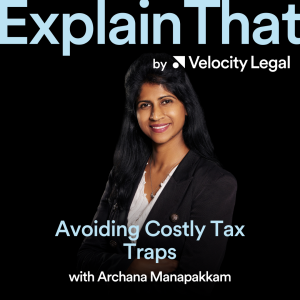
Thursday Mar 13, 2025
Thursday Mar 13, 2025
This episode unpacks the Commissioner of Taxation v Bendel [2025] FCAFC 15 decision and its impact on Division 7A. We break down key changes for businesses, trusts, and UPEs, provide practical steps for compliance, and address industry concerns about ATO responses. Tune in for expert insights on navigating these tax law shifts and protecting your clients.
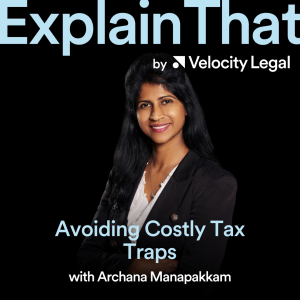
Thursday Mar 13, 2025
Thursday Mar 13, 2025
This episode is designed to help business owners, accountants, and financial advisors understand how seemingly routine transactions - such as borrowing money from a company, using company assets, or forgiving debts - can create unexpected tax liabilities. We’ll break down the common pitfalls, how to avoid them, and what professionals need to do to keep their clients compliant.
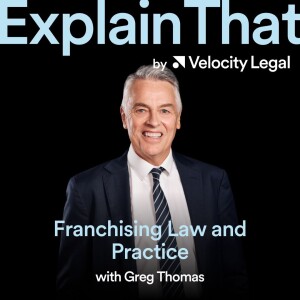
Tuesday Feb 25, 2025
Tuesday Feb 25, 2025
In this episode, the focus shifts to franchisees. Andrew Henshaw and Greg Thomas explore the critical aspects of selecting a franchise, emphasising the importance of understanding franchise agreements and disclosure documents. Topics such as due diligence, territory exclusivity, and ongoing compliance with the franchisor’s systems are highlighted. This episode also discusses key risks, such as entering into long-term agreements without a clear exit strategy and the potential challenges of running multiple franchise locations. Franchisees are advised to maintain good communication with franchisors and ensure they fully understand their legal obligations and business commitments.
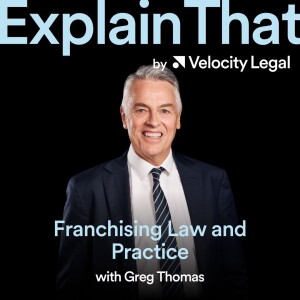
Tuesday Feb 18, 2025
Tuesday Feb 18, 2025
This episode focuses on franchisors and the critical legal and business issues they face. Andrew Henshaw and Greg Thomas discuss the importance of getting the right advice from legal, financial, and business professionals. Topics covered include the significance of intellectual property, asset protection, and structuring the franchise system. This episode also delves into franchise agreement terms, including royalty fees, franchisee selection, and compliance with the Franchising Code. Franchisors are encouraged to consider long-term support, maintain strong relationships with franchisees, and ensure consistency across the franchise network.
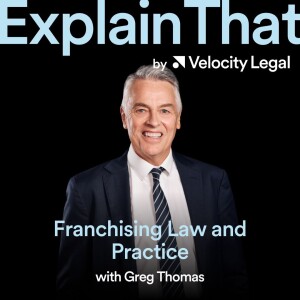
Tuesday Feb 11, 2025
Tuesday Feb 11, 2025
In this episode, Greg Thomas introduces the concept of franchising, contrasting it with licensing and other business models. The discussion begins with a general overview of how franchising operates, focusing on the relationship between franchisors and franchisees. This episode highlights the Franchising Code of Conduct, outlining key elements like pre-contractual disclosure, marketing funds, and franchise agreements. We also touch on the Australian Competition and Consumer Commission’s (ACCC) role in enforcing transparency and regulation in franchising, emphasising the need for proper disclosure and business advice.
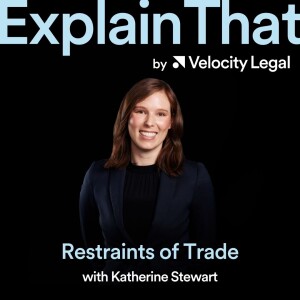
Tuesday Dec 17, 2024
Tuesday Dec 17, 2024
This final episode broadens the discussion to explore the interaction of restraints of trade with other areas of law, including the protection of confidential information. It offers practical tips for businesses managing risk when a departing employee seeks to take clients or information to springboard a new venture. Andrew and Katherine also look ahead and consider potential reforms that could impact the use of non-compete clauses in Australia.
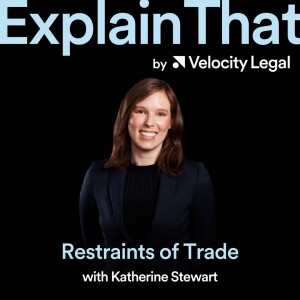
Tuesday Dec 10, 2024
Tuesday Dec 10, 2024
Katherine and Andrew look at some recent cases that highlight how restraints of trade are interpreted and enforced by the Courts. The discussion considers a case where well drafted post-employment restraints ultimately fell down because the business did not come to court with clean hands. It also touches on the commercial context and two cases where restraints did and didn’t prevent a former business owner from competing after a sale transaction.
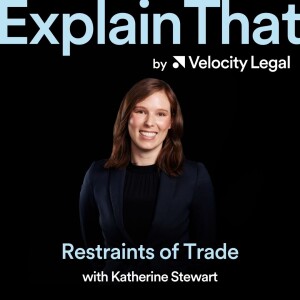
Tuesday Dec 03, 2024
Tuesday Dec 03, 2024
This episode lays the groundwork by considering the role of restraints in protecting business interests. Katherine and Andrew discuss different types of restraints in employment and commercial contexts. The discussion provides an overview of restraint principles, the different protections restraints can offer, and what happens if there is a breach.
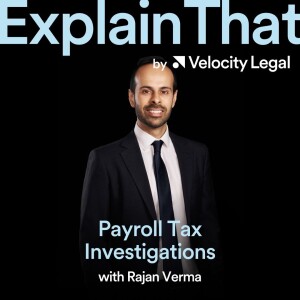
Tuesday Nov 26, 2024
Tuesday Nov 26, 2024
The final episode offers practical advice on preparing for a payroll tax audit, even before one begins. Rajan Verma provides tips for ensuring that payroll records are well-maintained, contractors are correctly classified, and businesses are aware of the grouping rules. The conversation also covers recent legal cases, such as those involving medical practices and the Uber ruling, that illustrate the evolving landscape of payroll tax law. With advice on proactive steps and best practices, this episode equips businesses with the knowledge to mitigate payroll tax risks effectively.
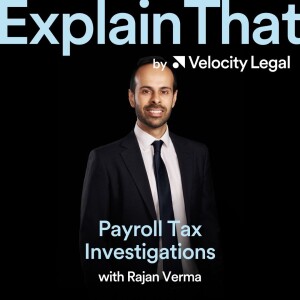
Tuesday Nov 19, 2024
Tuesday Nov 19, 2024
In this episode, Andrew Henshaw and Rajan Verma dive into the process of a payroll tax investigation. They explain the typical timeline and procedures, starting with the initial letter from the state revenue office. This episode highlights the importance of early preparation and accurate record-keeping to minimise penalties. Rajan shares insights from his own experience, noting how state revenue offices often uncover issues through sophisticated data matching. Listeners learn how to respond when selected for an audit and the importance of considering voluntary disclosures to mitigate potential penalties.

